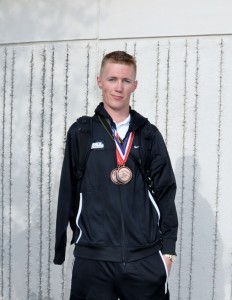By Jim Wenzel, WTC Stratcom

SFC Benjamin Trescott prepares to shoot in the air rifle finals at the Warrior Games.
At the Olympic Training Center Shooting Range in Colorado Springs, CO, Soldiers, Marines, Sailors, and Airmen gathered for the final matches to determine who will win Warrior Games gold.
Amidst the buzz and activity outside the range, the stillness of the firing line amplified the tension in the air. The small, slow movements of the shooters as they brought their weapons up to the target masked a fierce mental game that narrowed the competitive field by tenths of a point to determine the winner.
After following the Army shooting team over the past two weeks, I am amazed at the work they’ve put into training their minds to reset after each and every shot so they don’t lose mental focus or allow anxiety to raise their heart rate, rush shots, or squeeze the trigger before they have a true sight picture. Their wounds and injuries, both physical and invisible, such as Traumatic Brain Injury (TBI) and Post Traumatic Stress Disorder (PTSD), only made their shooting accomplishments more spectacular. And I am sure the techniques they use to calm and center themselves between shots are very therapeutic in almost anything they do.
Seven Army shooters made it through Tuesday’s preliminary round to reach the finals: CPT Juan Guerrero, SFC Benjamin Prescott, SSG Robert Laux, SPC David Oliver, and PFC Josh Bullis shot the air rifle prone;PFC Josh Bullis and PFC Latoya McClain shot the air rifle standing; and SSG Micheal Strong, SGT Paul Haines, and SPC David Oliver shot the air pistol.
The competition was fierce and there seemed to be an inordinate amount of Marines and their supporters in the stands. Fighting the rising tension, focusing downrange, and making each shot count was exhausting work for the entire Army team. Many of them closed their eyes between each shot as they willed themselves to relax and look forward to the next shot and not dwell on the ones already sent downrange.
One of the first team members off the line, SFC Benjamin Trescott, didn’t medal this year. He was, however, very proud to represent the Army. “It is very humbling,” he said. “It’s good to still feel that you have a purpose, that you can push yourself to different levels of competition.”

SPC David Oliver earned a bronze medal in air rifle prone at the Warrior Games shooting finals.
SPC David Oliver was the first to medal as he took bronze in the air rifle prone. Always cool and collected, he described the intensity in the room saying, “It’s pretty high octane. I can’t remember being this pumped.”
PFC Josh Bullis also took bronze in the rifle prone. He had a nail-biting come-from-behind victory by first tying and then surpassing a Marine in the final few shots. Each announcement of his score drew enormous cheers from the Army crowd when he started to draw ahead of his competitor. Bullis is another steely-eyed competitor and you wouldn’t think he was rattled by the atmosphere of the packed shooting gallery until he said, “I’ve been shot at before and I haven’t been that nervous.”
A final highlight of the competition didn’t result in a medal but it did draw a lot of attention from the Army’s Warrior Games shooting coach, MSG Howard Day. PFC Latoya McClain came into the finals at the rear of the pack as her score was a cumulative total of two days of competition. That didn’t stop her from shooting her heart out as she turned in a nice tight group of shots that would have made her a contender had she not been hampered by the previous day’s score.
Day spoke candidly about her excellent performance by saying “She shot a group as tight as the gold medal winner. She has come so far in the couple of weeks we’ve worked together, I wouldn’t be surprised if the Army Marksmanship Unit comes knocking on her door at some point in the future… She brought her A-game today.”
The Army may have only snapped up two bronze medals in the competition, but the team is taking home a far greater prize. They have gained an experience of a lifetime that will allow them to move forward knowing they didn’t hold anything back—they left it all there on the firing line at the Olympic Training Center.
As someone who was exhausted simply watching the competition unfold, I gained a deep respect for these wounded, ill, and injured Soldiers and Veterans. As they move forward to other, more difficult challenges, they can certainly do so with the confidence gained from their Warrior Games experience.













